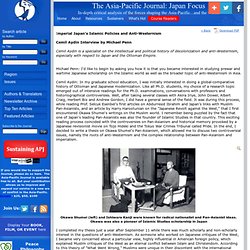

Imperial Japan's Islamic Policies and Anti-Westernism. Imperial Japan’s Islamic Policies and Anti-Westernism Cemil Aydin Interview by Michael Penn Cemil Aydin is a specialist on the intellectual and political history of decolonization and anti-Westernism, especially with respect to Japan and the Ottoman Empire.

Michael Penn: I'd like to begin by asking you how it is that you became interested in studying prewar and wartime Japanese scholarship on the Islamic world as well as the broader topic of anti-Westernism in Asia. Cemil Aydin: In my graduate school education, I was initially interested in doing a global-comparative history of Ottoman and Japanese modernization. Like all Ph.D. students, my choice of a research topic emerged out of intensive readings for the Ph.D. examinations, conversations with professors and historiographical controversies. Okawa Shumei (left) and Ishiwara Kanji were known for radical nationalist and Pan-Asianist ideas. Cemil Aydin: This is perhaps similar to contemporary America.
Lothrop Stoddard Islam in China Kita Ikki.
Ottoman History Podcast. Ottoman Labor History Archive. History from Below in the Ottoman Empire and the Modern Middle East: An Archive This website is designed as a clearinghouse for information about history from below, in the widest sense, during the eras of the late Ottoman Empire and the modern Middle East. It includes materials about workers, worker activism, history from below, and popular history. This site aims to build up a web-archive of rare, scattered and difficult to obtain primary sources relating to history from below. The goal is to build research capacity and illustrate research possibilities for students and academics in the field, while offering to the wider public an unusual glimpse of the usually forgotten pasts of ordinary people in the region. Visitors to the site are free to download materials they find here, we ask only for proper attribution.
And, we welcome additions that visitors might care to make. If demand calls for it, we will expand the site to include photographs, maps, and podcasts. Makdisi - Artillery of Heaven roundtable. The Genesis of Young Ottoman Thought: A Study in the Modernization of ... - Şerif Mardin. The Cambridge History of Turkey. Reading. Here you can find continually updated lists of secondary literature on and related to the Ottoman Empire.

These are selective and by no means exhaustive lists. Many of the arguments in these books contradict each other but all can be considered important works for understanding the different issues and debates in Ottoman history. For readers looking for introductory information, some of the overviews may be particularly useful. For hardcore students of Ottoman history, our thematic lists and regional breakdowns might be of more use. If you want to suggest the inclusion of a work or list of works please feel free to get in touch. Overviewsİnalcık, Halil, and Donald Quataert. V.H. Aksan - McMaster University. Virginia H. Aksan, Chair of History, 1999-2006, specializes in eighteenth and early nineteenth century Ottoman history, and teaches courses in Isamic, Middle Eastern and most recently Mediterranean history. The Ottoman Empire, 1700–1922. An Economic and Social History of the Ottoman Empire. Frontiers of the State in the Late Ottoman Empire. Using new archival material from Ottoman, Arabic and European sources, Eugene Rogan documents the case of Transjordan to provide a theoretically informed account of how the Ottoman state restructured itself during the last decades of its empire.

In so doing, he explores the idea of frontier as a geographical and cultural boundary and sheds light on the processes of state formation that led to the creation of the Middle East as it is today. The book concludes with an examination of the Ottoman legacy in the modern state of Jordan. "Rogan's study makes a significant contribution to scholarly discussions of Ottoman and Middle Eastern history by pointing out just how effective Ottoman provincial administration could be in the late nineteenth century. " Dr Eugene L. Rogan - Academic Staff - Faculty of Oriental Studies - University of Oxford. Hanioglu, M.: A Brief History of the Late Ottoman Empire.
At the turn of the nineteenth century, the Ottoman Empire straddled three continents and encompassed extraordinary ethnic and cultural diversity among the estimated thirty million people living within its borders.

It was perhaps the most cosmopolitan state in the world--and possibly the most volatile. A Brief History of the Late Ottoman Empire now gives scholars and general readers a concise history of the late empire between 1789 and 1918, turbulent years marked by incredible social change. Moving past standard treatments of the subject, M. Sükrü Hanioglu emphasizes broad historical trends and processes more than single events. He examines the imperial struggle to centralize amid powerful opposition from local rulers, nationalist and other groups, and foreign powers. Review: "There are many fine insights in this short book. The Well-Protected Domains. The Politicization of Islam: Kemal H. Karpat. Bandits and Bureaucrats, The Ottoman Route to State Centralization. Revolution and Constitutionalism in the Ottoman Empire and Iran. As a wave of democratic social movements, under the influence of “velvet” revolutions, is sweeping the Middle East, this book calls attention to an earlier wave that swept the region a century ago.

In his book on constitutional revolutions in the Ottoman Empire and Iran, Nader Sohrabi considers global diffusion of institutions and ideas, their regional and local networking, and the long-term consequences for adaptation to local exigencies. There are lessons to be learned here.